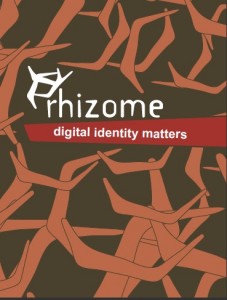Digital Identity Matters
 Over the last two years I have been lucky to work on a project called Rhizome. Rhizome is a research and development project, funded by Eduserv, exploring the key social and technical elements that impact on the construction of online identities.
Over the last two years I have been lucky to work on a project called Rhizome. Rhizome is a research and development project, funded by Eduserv, exploring the key social and technical elements that impact on the construction of online identities.
The Rhizome awareness report, published today and entitled ‘Digital Identity Matters’ highlights the issues we face when dealing with our online identities. It outlines the design pattern approach that has been used to help define a set of problems and their solutions that all relate to our understanding and use of a digital identity. The material is released as an open access resource and is aimed at contributing to a deeper understanding of digital identity and the impact it can have on the individual and those around them. It will be of relevance to anyone who uses the Internet to disclose personal information about themselves – be it purposefully through the use of social media tools or as a result of work-based professional activities. The report can be downloaded from the Rhizome project web site. The following text is an except from the introduction to the report.
“Our relationship with the Internet is changing. Mobile devices, wireless connectivity, and our increasing virtual presence across multiple social media services have all but collapsed the boundary between being online or offline. Together the virtual and the real form the seamless space in which many of us live out our daily lives. We fashion the self through social interaction, community and network affiliations, and here come to construct our identities as well as interpret the identity of others.
The ease with which individuals can now produce, reproduce and distribute digital content has powerfully shifted the ways in which we think about global connectedness, media access and distribution, social action and the production of knowledge.
Our ability to engage so readily with digital media and online networks is empowering but our resultant actions also make us vulnerable. We suffer the pressures of information overload, time management and, as we argue in this publication, the need to curate our increasingly visible digital lives. The Internet is not a set of static objects but a dynamic network of connected, interacting subjects.
How does our online visibility affect who we think we are and our ability to act with purpose and intent? How should we ethically respond to concerns about the impact of one person’s online behaviour upon the lives of others. These are two of the questions that are explored here.
We focus on a design pattern called ‘Putting Children First’ and two supporting case-stories that describe the dangers of using an online photo-sharing service. Together they illustrate the complexities of negotiating our responsibility to others when we are in the process of developing our own digital identities. This pattern offers a design solution for using social media in a thoughtful, literate and ethically responsible way.
One of the aims of this publication is to raise awareness and we hope you will distribute this material as widely as possible.”

How does our online visibility affect who we think we are and our ability to act with purpose and intent? http://tinyurl.com/2bxxm6r